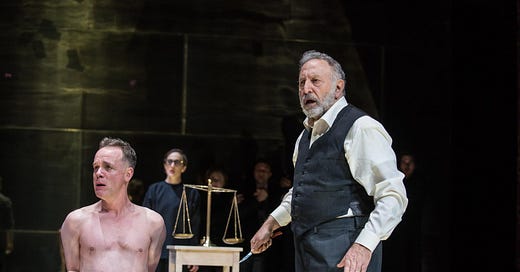Review: The Merchant of Venice (RSC, dir. Polly Findlay, 2015)
Hysteria, menace and strange outfits.
A rather polarising performance; several publications took issue with the big blank set and the bizarre costuming; at least one (as memory serves, The Guardian) took issue with the rather prosaic delivery of the lines.
Notable for its rather hysterical Antonio as played (I think quite interestingly and well) by Jamie Ballard, who starts the play sobbing and looks about to do the same at the end. It's almost enough to forget the scene in which he literally spits, twice, in Shylock's face at point-blank range. Khoury's Shylock was received polarisingly, too, with some seeing his performance as moving and quietly menancing, while others saw it as rather pathetic — an old downtrodden man in a cardigan.
It's also notable for really playing up the romantic nature of Bassanio's relationship with Antonio. Interestingly, Antonio's love seems consistent, if jittery and hysterical. When he's first alone with Bassanio he can barely get his words out and instead starts gurning and pantomiming a bizarre American accent. But, as Merchant, 1.1 moves forward, the two move closer together in meet with the magnetic inevitability of a kiss, one that happens so quickly that the audience can't quite tell who instigated it. It's Antonio's voice, though, that gives away just how it has affected him, quavering and modulating all over the place post-kiss. Bassanio's stays level; tellingly, he moves closer towards Antonio when he thinks he might be about to borrow (more!) money from Antonio, but becomes aloof when learning that Antonio's ships are all at see. The two men are in each other's arms again only when Antonio says he'll 'try what my credit can in Venice do.' However, Bassanio mirrors Antonio's early hysteria in the infamous court scene later, realising too late what happens when you equate money with love (see 'To you, Antonio, I owe the most in money and in love' (Merchant, 1.1.121-138)), screaming, emptying a bag of banknotes all over the stage, before finally kissing Antonio — this time in full view of his friends and wife, in public and not private — tenderly and passionately, making Portia's line, 'Your wife would not thank you for that,' ring with menace and jilted sadness. I'd argue that this production really does try to make this work, making much of the strange awkwardness and gender-friction in the denouement in the argument over the rings and compounded by Lorenzo and Jessica's melancholy night-time discussion of doomed lovers and Jessica's inability to be cheered by music.
The play ends, then, with a stage full of candles, which have gradually been brought on (with some excellent physical comedy) by Lancelot Gobbo. Antonio is eventually left alone on the stage, just as he began, his love paradoxically requited and unrequited — the candles make it clear who bears the torch.
It's a troublesome play, and it's hard for me to really know what I made of this. It did feel as though it was yearning for symbolism it didn't quite understand itself; the big empty stage made all the more so by all the mirrors worked in some cases but often worked in counterpoint to the intimacy needed for certain scenes, such as the courtroom, in which too much open space made some of the actors look rather lost. It succeeds, though, in capturing the melancholy nature of a play that never really feels to a modern audience particularly comic. Perhaps that's the best we can expect of Shakespeare, William. The Merchant of Venice: unevenness, mirrors, and, ultimately, a bit of dissatisfaction.4
Details here.





